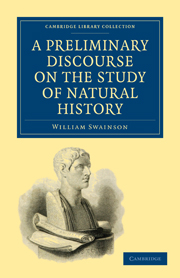Book contents
- Frontmatter
- Contents
- PART I RISE AND PROGRESS OF ZOOLOGY
- PART II ON THE GENERAL NATURE AND ADVANTAGES OF THE STUDY OF NATURAL HISTORY
- CHAP. I
- CHAP. II
- PART III OF THE PRINCIPLES ON WHICH NATURAL HISTORY RELIES FOR ITS SUCCESSFUL PROSECUTION, AND THE CONSIDERATIONS BY WHICH THE NATURAL SYSTEM MAY DE DEVELOPED
- PART IV ON THE PRESENT STATE OF ZOOLOGICAL SCIENCE IN BRITAIN, AND ON THE MEANS BEST CALCULATED FOR ITS ENCOURAGEMENT AND EXTENSION
- APPENDIX
- INDEX
- Frontmatter
- Contents
- PART I RISE AND PROGRESS OF ZOOLOGY
- PART II ON THE GENERAL NATURE AND ADVANTAGES OF THE STUDY OF NATURAL HISTORY
- CHAP. I
- CHAP. II
- PART III OF THE PRINCIPLES ON WHICH NATURAL HISTORY RELIES FOR ITS SUCCESSFUL PROSECUTION, AND THE CONSIDERATIONS BY WHICH THE NATURAL SYSTEM MAY DE DEVELOPED
- PART IV ON THE PRESENT STATE OF ZOOLOGICAL SCIENCE IN BRITAIN, AND ON THE MEANS BEST CALCULATED FOR ITS ENCOURAGEMENT AND EXTENSION
- APPENDIX
- INDEX
Summary
(41.) Could we suppose man had never known evil, – that he had continued, as at first created, a terrestrial, yet an immaculate being, alike a stranger to the bad passions and the inordinate desires that now agitate him, – what pursuits, may we suppose, would occupy his time? or upon what subjects would he exercise those powers of reason by which he is united to the spiritual world? The answer is obvious. The works of God, as manifested in all visible nature, would be his only study. Surrounded by innumerable objects attractive by their beauty, wonderful by their construction, or interesting by their economy, his days would be spent in surveying the material world; – his heart enlarged, and his reason exercised, in meditating on all that he saw. Every new discovery would increase his veneration for the Divine Author of such wonders; and although placed upon earth, his contemplations would be those of the inhabitants of heaven. Such is the reply suggested by reason, to our previous question; and such, does inspiration assure us, was the occupation of the parent of mankind. “And Adam gave names to all cattle, and to the fowls of the air, and to every beast of the field.” It is fit that the study of nature should be coëval with the creation of man. Though his spirit has been changed, – though care and trouble, those thorns and thistles of his present state, entangle and distract him, and he is called to the discharge of moral and social duties,–yet this remnant of primeval happiness is still left to him.
- Type
- Chapter
- Information
- A Preliminary Discourse on the Study of Natural History , pp. 93 - 106Publisher: Cambridge University PressPrint publication year: 2009First published in: 1834



